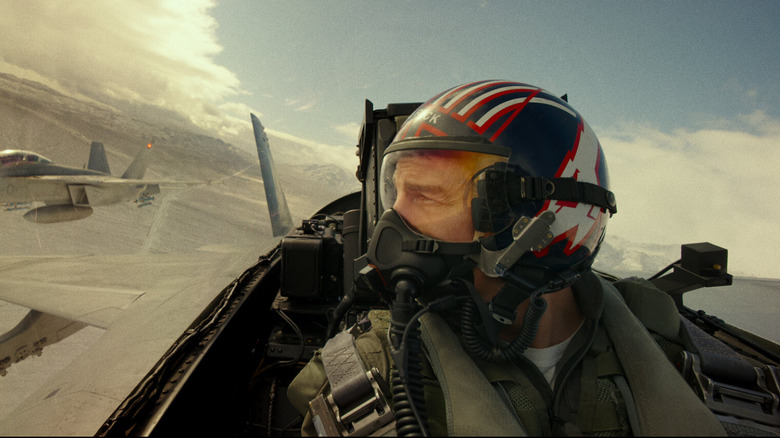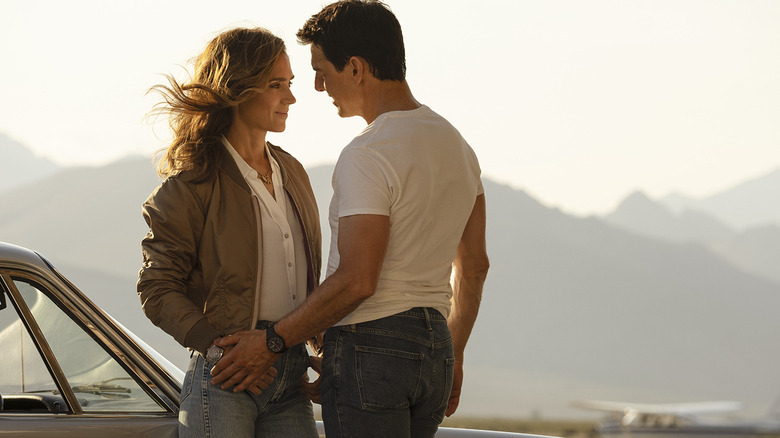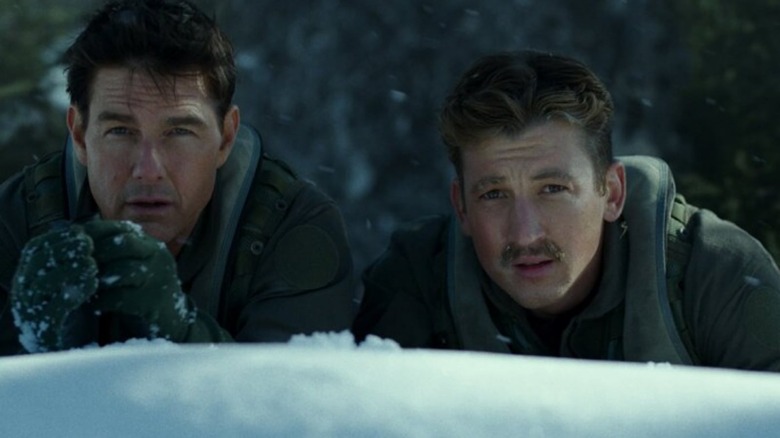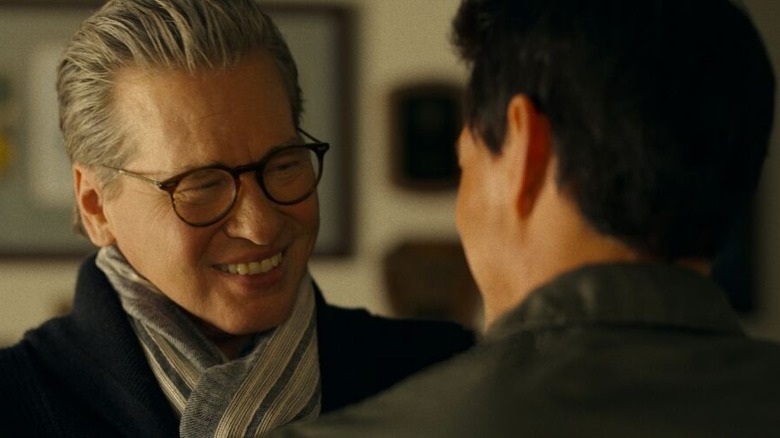The 2023 Oscar Nomination For Top Gun: Maverick's Screenplay Recognizes The Film's Strengths
With the 2023 Oscar nominations announced today, "Top Gun: Maverick" is flying high with six nominations including Best Picture, Adapted Screenplay, Best Sound, Film Editing, Best Visual Effects and, finally, Best Original Song for the Lady Gaga's "Hold My Hand." Seeing how the long awaited sequel almost single-handedly brought the moviegoing public back to theaters after the pandemic, the recognition today for Best Picture didn't seem to surprise that many people. Not only is it one of the best sequels ever made, it's grossed almost $1.5 billion at the box office. That kind of mammoth success doesn't usually translate to Oscar gold, but Tom Cruise and company delivered a surprisingly emotional follow-up that doesn't just thrill the audience with aerial acrobatics. It actually has heart.
One nomination that is a little unexpected is Adapted Screenplay. At first glance, the script (by Ehren Kruger, Justin Marks, and Christopher McQuarrie, with a story from Eric Warren Singer and Peter Craig) doesn't seem in concert with the dialogue-heavy screenplays that usually prick up the ears of voters. But the economical storytelling and pinpoint, character-driven dialogue on display perfectly illustrates how to make a great sequel, and how simplicity can be its own blockbuster art form. The writers who contributed to the script are a who's who of prominent screenwriters. Among them stands Christopher McQuarrie, Oscar winner for Best Screenplay for "Usual Suspects," who Tom Cruise brought aboard to work on the script after the sequel was delayed for a year. That time to tighten up the screenplay gave the creative team a chance to tell their own story, instead of just bottling the '80s nostalgia of Tony Scott's original film.
Why is Top Gun: Maverick nominated for Adapted Screenplay?
The nomination for Best Adapted Screenplay for "Top Gun: Maverick" instead of Best Original Screenplay is something of an awards season anomaly that doesn't happen very often. Usually, the nomination goes to a screenwriter who is adapting an existing work for the screen, which is the case this year with writer/director Sarah Polley's much deserved nod for "Women Talking," adapted from the novel of the same name by Miriam Toews. Technically, any film based on any kind of previously established material falls into this category, including sequels. Over the entire history of the Oscars, sequels don't usually get that kind of recognition, so it seems a little odd when something like "Top Gun: Maverick" (which is clearly its own movie) gets lumped into the Best Adapted Screenplay category. But, because it's a sequel, it fits the bill.
Since Rian Johnson's "Glass Onion" is a sequel to "Knives Out," the Netflix murder mystery is also nominated for Best Adapted Screenplay this year. Other notables in the past have usually been in the same blockbuster mold as "Top Gun: Maverick," including "Lord of the Rings: The Return of the King" and "The Godfather Part II." Some smaller, more relationship-based films have also received the nomination, including my personal favorite, "Before Midnight."
So, now that we've established why the "Top Gun" Maverick" script qualifies in this particular category, let's dive in to what makes the screenplay truly soar.
The dialogue is part of the action
The lengths to which director Joseph Kosinski, Tom Cruise, the other actors, and the entire filmmaking team underwent to achieve the real-world aerial combat scenes are truly staggering. A sequel taking place 36 years after the original "Top Gun" could've been remembered for the action alone, and audiences still probably would have shown up in droves. But the success of the film mainly rests on the relationships, past and present, that drive the characters to do what they do.
When Maverick meets Penny (Jennifer Connelly) — a long-lost flame referenced as the Admiral's daughter in the original — there's a sense of regret when he talks to her at the Hard Deck bar. Both of them don't have to say much to each other, but when they do, it's flirtatious without being sappy, avoiding some of the melodramatic dialogue between Pete Mitchell and Charlie (Kelly McGillis) in "Top Gun." Because Penny and Maverick have history, they don't have to say as much to each other. Maverick's still haunted by the death of Goose (Anthony Edwards), which comes to a head when he is forced to instruct Goose's rage-fueled son Rooster (Miles Teller). Again, the dialogue between them is explosive but only in quick bursts, especially when they almost come to blows at one point.
The lines of dialogue in the emotional scenes hit hard, but they're not overly long or flowery, mirroring the same dialogue the pilots give when they're undergoing intense training. It's quick and economical because their lives are at stake. As a result, the whole script is streamlined to have maximum impact, whether the characters are up in the air or on the ground.
The Iceman of it all
There's also a mythic quality to "Top Gun: Maverick" that lends itself to epic storytelling. Due to the huge delays that the film endured over the years, the screenwriters had time to address how many years have passed since Iceman (Val Kilmer) and Maverick first butted heads in "Top Gun." There's a meta quality to the writing that addresses Maverick's age and, in doing so, Tom Cruise's age as well. That added element is in lockstep with the ticking clock of the actual mission the pilots are about to go on.
It's a subtle addition that offers a simple story an unexpected depth. The writing team was smart enough to know that just having the on-screen reunion between the two old combatants was going to be powerful, in and of itself. When Iceman, in what's arguably the film's most emotional scene, types "There's still time" on his computer screen, they have a double meaning.
McQuarrie, in an interview with Mulderville, talked about the writing process and, specifically, how "Top Gun: Maverick" eventually became its own thing:
"We found ourselves time and again leaning towards recreating moments of the film ... as opposed to creating new ground. And we found that the more we let go of the original movie and went in our own direction, the film became much more true. There really was the possibility to make something that stood alone."
The awards attention is richly deserved. "Top Gun: Maverick" is that rare action movie that truly pays off, in exhilarating fashion. It serves as a blueprint of how to construct the perfect sequel. As McQuarrie explains, "It not just in its scope and its scale, but in its emotion, in its characters, in its storytelling. It's very much a modern film, but it's also very much, steeped in classic storytelling."



